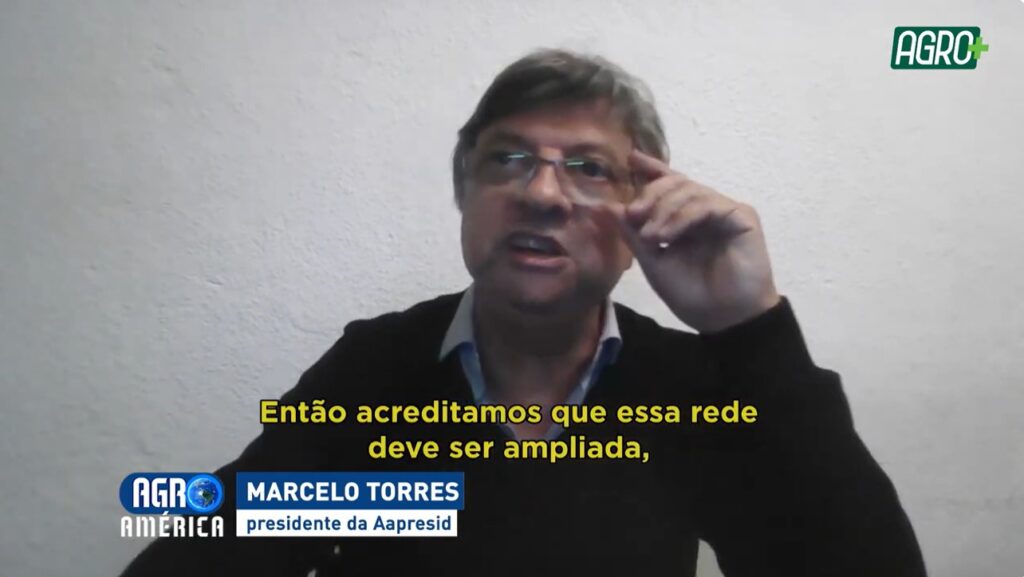
Brasilia, 5 August 2025 (IICA) – Agricultural producers must become actively involved in global discussions on the future of agriculture, draw closer to consumers and demonstrate the work they are carrying out to achieve greater productivity and sustainability, stated the President of the Argentine Association of Direct Seeding Producers (AAPRESID), Marcelo Torres.
The agricultural producer and leader was interviewed by the Agro América program, broadcast by the Brazilian TV channel AgroMais, a few days before the AAPRESID 2025 Conference. The event will bring together leading local and international figures in Buenos Aires, Argentina, to discuss and plan for key issues in the future, linking science and production with special emphasis on agricultural transformation and innovation.
Agro América is a program broadcast by the Brazilian TV channel AgroMais, owned by the Bandeirantes Communication Group and produced in partnership with the Inter-American Institute for Cooperation on Agriculture (IICA).
The program covers current topics in the agriculture sector and rural areas of IICA member countries, aiming to promote the exchange of experiences and discussions on the challenges and opportunities related to agricultural and rural development in Latin America and the Caribbean.
For the second consecutive year, the AAPRESID Conference will feature IICA’s prominent participation, within the framework of a strategic partnership between the two institutions. The event will include special panel discussions, a photographic exhibition and a side-event geared towards AgTechs.
Manuel Otero, Director General of IICA; agricultural producer and former U.S. Ambassador Kip Tom, Vice Chair of Rural Policy at the America First Policy Institute; Jack Bobo, Executive Director of the Rothman Family Institute for Food Studies at the University of California, Los Angeles (UCLA); and Rattan Lal, 2020 World Food Prize laureate and a globally renowned soil sciences expert, are among the leading figures who will participate alongside IICA in the Conference, to be held from 6 to 8 August.
Torres commended IICA on its role driving coordination between public and private sector stakeholders and facilitating interactions between science, producers and technology companies in the Americas.
“IICA’s hemispheric vision prioritizes cooperation and the Institute is directly involved in public policymaking, making IICA a key player in positioning our production chains. Our partnership with IICA today is very strong and very promising”, he noted.
No-till farming
During the TV interview, Torres explained that AAPRESID was founded in 1989 in response to growing concerns among Argentinian producers regarding water erosion on their fields. “We began to consider ceasing to till the land, as was being done in other countries. By retaining and utilizing residues from previous harvests, we were able to reverse soil erosion and deterioration”, he added.
AAPRESID is now a leading organization at the regional and global levels, with more than 35 years of experience developing production systems that regenerate soils and the environment. Its network of 1,800 partners across close to 11 million hectares apply the best technology, knowledge and innovation.
“Many years have passed since we began to implement direct seeding in addition to other technologies. We now view it as a system that rotates winter and summer crops and utilizes ecosystem service crops; this keeps fields green and alive year-round and helps to control weeds and to sequester carbon. Producers have taken on a leading role in these changes. We are constantly evolving and learning”, remarked Torres.
“We have two priorities: encouraging producers to take charge of their own development and to bet on innovation, and calling on science and technology to adapt to Argentina’s various environments and climates”.
When asked about the main challenges facing AAPRESID producers, Torres referred to the need to deepen digitalization and to build more solid sustainability indicators.
To that end, he noted that AAPRESID is working to develop a platform in which the fields of all its members will be georeferenced.
“We have satellite images and yield maps”, he said, “but we must integrate them with georeferencing, as that will enable us to better tailor our recommendations with respect to fertilization or planting density. The data we require to analyze our crop years is practically the same data we use to certify our water footprint or carbon footprint. In other words, the same information, organized in a platform, will help us to produce better and to provide consumers with the indicators they require”.
Torres also called on producers to take part in public discussions and in efforts to communicate the reality of agricultural activities. “Our institution regularly participates in international conferences in which the present and future of agriculture are discussed. We’ve noticed an evolution, perhaps since the pandemic. Nowadays, discussions have become a little more rational. People used to think that organic agriculture would become the solution to all our problems, but there is now greater awareness of the key role of science and the value of direct seeding, which uses less fossil fuels and releases less carbon into the atmosphere”, he added.
“What’s important”, he continued, “is for producers to feel part of these processes and to be able to communicate the reality of the production process to consumers. Those of us in producer organizations talk amongst ourselves, but we must understand that, in order to truly make headway, we must work together with the industry that processes raw materials”.
“Producers must not be left out of public discussions. The world is facing an extremely complex challenge, which is increasing food production while reducing the impact on the environment. In this scenario, countries in the region must stand together, because we face very similar challenges. We must position ourselves as a regional bloc, and, in this regard, IICA is playing an irreplaceable role”, he concluded.
Watch the full AgroMais program here:
https://www.youtube.com/watch?v=wPH6cpwPUlI
More information:
Institutional Communication Division.
comunicacion.institucional@iica.int











